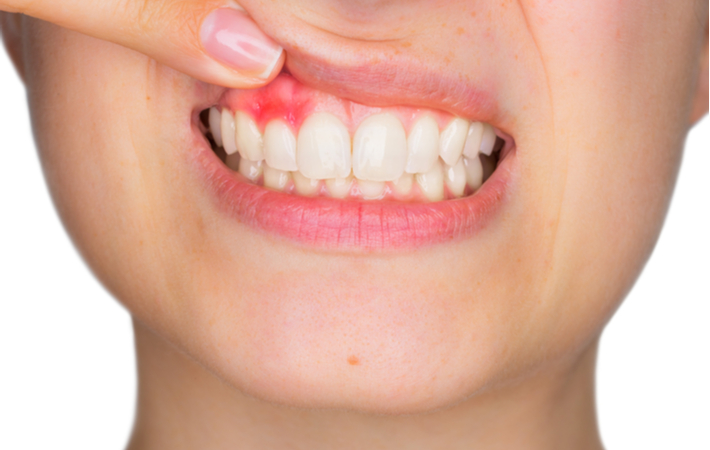The three main ways to prevent bad breath is to brush and floss teeth twice daily, use a tongue scraper to get rid of bacteria on the tongue and visit your dentist regularly. However, bad breath, also called halitosis, affects many Canadians even with proper oral hygiene practices. However, it is possible to treat and in some cases, prevent entirely.
Dry Mouth
Dry mouth is one of the leading causes of halitosis and can be the result of stress, medications, radiation or chemotherapy, tobacco or recreational drug use, and autoimmune diseases such as Sjorgren’s syndrome.
The commonalities between these causes are that the salivary glands are negatively affected, inhibiting the production of saliva. Saliva keeps the mouth moist and washes away any food particles or bacteria from the surface of the teeth. Without the presence of saliva, bacteria or food stays on the surface of the teeth and can start to produce an odour.
Treatment
If you are experiencing dry mouth that is causing bad breath, you’ll need to get a professional opinion or diagnosis from your dentist to pinpoint the correct treatment for you. Some medications can cause dry mouth, so it is best to consult your dentist so they can conduct tests and make adjustments to your dosages as needed. Your dentist may be able to recommend products that are specially formulated to help with dry mouth.
If you want to prevent bad breath caused by dry mouth, follow a strict high-level hygiene routine. Brushing and flossing multiple times a day can keep odour causing bacteria levels low, keeping breath fresh. Additionally, avoiding smoking, alcohol, and caffeine can reduce the buildup of bacteria and lingering odours.
Gum Disease

Gum disease – also called gingivitis – is very common among adults. Gingivitis is caused by an inflammation of the gums due to plaque and bacteria buildup. It is important to follow good oral hygiene habits – like brushing and flossing every day – to prevent gum disease and tooth decay.
The buildup of plaque and bacteria that causes infection and disease also causes the unpleasant odour that goes along with halitosis. Your dentist will check for early signs of gum disease at every exam and cleaning as beginning stages often go undetected.
Catching gum disease before it happens is important to prevent symptoms such as halitosis. Check your gums daily to watch for changes in colour, bleeding, soreness, puffiness, or sensitive teeth.
Treatment
The best treatment for gum disease is to prevent it entirely by brushing twice a day and flossing once a day. However, if gingivitis begins to develop, the only way to let gums heal is to visit a professional to remove plaque and clear away bacteria.
Serious cases of gingivitis may need to be treated with a periodontist, who are specialists in treating gum disease and restoring bone and tissue loss because of it.
Periodontal Disease
If gingivitis is left untreated, it can progress to periodontal disease, which affects the bone and gums that keep teeth in place. Over time, plaque buildup causes weakened gums and bone loss, leading to spaces around the teeth that need professional cleaning.
Some symptoms that occur include loose teeth, bleeding, pus, and a persistent bad taste in the mouth. If you lose a tooth due to periodontitis, your dentist will be able to provide you with emergency dental care and provide guidance on how to correct and prevent future damage.
Treatment
As periodontitis is an advanced stage of gum disease, it is important to maintain good oral hygiene habits to prevent gum disease from the beginning. If it has progressed to the point if periodontal disease, your dentist will be able to suggest the best course of action to start the healing process.
Tooth Decay
When bacteria and food particles aren’t properly removed from the surface of the teeth, cavities can begin to form, eating away at the enamel of our teeth. If cavities aren’t properly dealt with, they can cause further decay and infection which may lead to abscesses and broken teeth.
The buildup of bacteria that causes a cavity can cause bad breath, as well as untreated cavities and further decay can produce a foul-smelling odour.
Treatment
Keeping an eye on your oral health for signs of cavities is important to prevent further tooth decay. Regular visits to the dentist can ensure any early signs are caught and teeth are receiving professional cleaning.
Diabetes

Diabetes can cause bad breath for two different reasons; periodontal disease, and high levels of ketones in the blood.
Diabetes can reduce blood flow throughout the body, including gums, by damaging blood vessels. Additionally, diabetes can raise glucose levels in the mouth which may breed bacteria and promote infection. If someone with diabetes develops periodontal disease, it will often take them longer to heal and it will be more severe than someone without diabetes.
Diabetes occurs when your body cannot produce insulin, which supplies your cells with the fuel they need in the form of glucose. When your body cannot burn sugar, it burns fat instead, which produces ketones that build up in urine and blood.
A large number of ketones in the body can cause bad breath that may smell sweet, or similar to acetone (a type of ketone) which is commonly found in nail polish remover. Diabetics are at risk of diabetic ketoacidosis (DKA), which is when ketones rise to unsafe levels.
Along with bad breath, DKA can result in frequent urination, high blood glucose levels, abdominal pain or vomiting, difficulty breathing, or confusion. DKA can be highly dangerous for diabetic individuals, and if these symptoms are present, you should seek medical help immediately.
Treatment
If you have diabetes and are wanting to control bad breath, having a rigid daily oral hygiene can help decrease the buildup of bacteria. Additionally, keeping blood glucose levels in their target range will ensure ketones are kept under control and sugar-free mints or gum can stimulate the production of saliva to avoid dry mouth.
If you are diabetic, visiting your dentist regularly will ensure any concerns are dealt with promptly and early signs of DKA or gum disease are caught before they can progress.
Kidney Disease
If your bad breath smells like ammonia, it could be a sign that you may have kidney disease. The kidneys filter out and remove waste and toxins – such as urea, which breaks down into ammonia – from the body through urination. Kidneys also regulate blood pressure and control red blood cell production.
Kidney disease can be caused by high blood pressure, diabetes, autoimmune diseases, medications, or injury. If you notice your breath smells like ammonia, visit your doctor as soon as possible to have any underlying causes treated. Additionally, regular checkups with your dentist are important to build a good oral hygiene routine.
Treatment
Always make an appointment with a medical professional at the first signs of illness, as breath that smells like ammonia will not subside until the underlying cause is treated. Until then, brushing and flossing daily, and cleaning your tongue can help fight the buildup of bacteria in the mouth. As well, drinking lots of water, avoiding tobacco products, and chewing sugar-free gum can mask any unpleasant odours.
Postnasal Drip/Sinus Infection
Postnasal drip is the secretion of mucus from the nose and throat. This mucus is full of bacteria and easily breeds more, which can cause infection and bad breath. Additionally, dairy products can increase mucus production, making it thicker and worsening post-nasal drip or congestion.
Treatment
If you start feeling flu-like symptoms, you may be getting a sinus infection. Visit a medical professional as soon as possible so you can receive antibiotics if you need them. Nasal washes can also help reduce the mucus produced from the nose to the throat.
Acid Reflux/Gastroesophageal Reflux Disease
Gastroesophageal reflux disease, otherwise known as acid reflux or heartburn, is a condition in which the contents of the stomach flow backward into the esophagus. The undigested food, bile, and stomach acids coming back into the esophagus can cause pain and discomfort and may lead to bad breath.
Acid reflux is caused by an overly relaxed lower esophageal sphincter (LES). It is a muscle that acts as a barrier to the stomach and operates similarly to a valve. When it is working correctly, it will open to allow food to pass through the esophagus into the stomach, but when it is too relaxed or faulty, it will remain open, allowing the contents in the stomach to flow back upwards.
Treatment
When this happens, you’ll likely experience heartburn or a bitter and unpleasant taste in your mouth, which can cause bad breath. However, all of the symptoms of acid reflux can be controlled and managed by making a few lifestyle changes.
Quit Smoking
Nicotine products on their own can cause bad breath, but using them relaxes the LES which can cause acid reflux.
Let Food Digest
After you eat, let your food digest before performing physical activity or lying down. This can allow the contents in your stomach to digest while your LES stays closed.
Manage Meals and Weight
Eating more frequently, small meals can help to manage weight and the effects of acid reflux. Having a large meal can upset the stomach and allow more undigested food and stomach acid to make its way into the esophagus. Additionally, maintaining a healthy weight puts less pressure on the LES.
Diet Changes
Certain foods can increase the acidity of the stomach or relax the LES, causing acid reflux. Additionally, if you experience bad breath, avoiding pungent foods can help to limit that.
Food and drinks such as alcohol, caffeinated liquids, onions, garlic, citrus fruits, tomatoes, peppermints, spicy foods, and fried or fatty foods should be avoided to help control acid reflux and the subsequent halitosis related.
Eating food high in fibre can help promote digestion which reduces the likelihood of acid reflux happening. Additionally, food high in fibre can keep you feeling full which may help manage weight.
Over the Counter Medication
There are many different kinds of medication you can purchase over the counter at your local pharmacy or drug store that can help quell the effects of acid reflux. Histamine blockers, proton pump inhibitors, and antacids are all helpful and effective in reducing discomfort related to acid reflux.
Some chewable antacids are flavoured or include breath-freshening ingredients to help tackle both symptoms of acid reflux at once.
Chat with your doctor to get a professional opinion on what course of action is right for you.
If you are experiencing bad breath of any kind, book an appointment with your dentist so you can receive the right information to treat your specific case.








